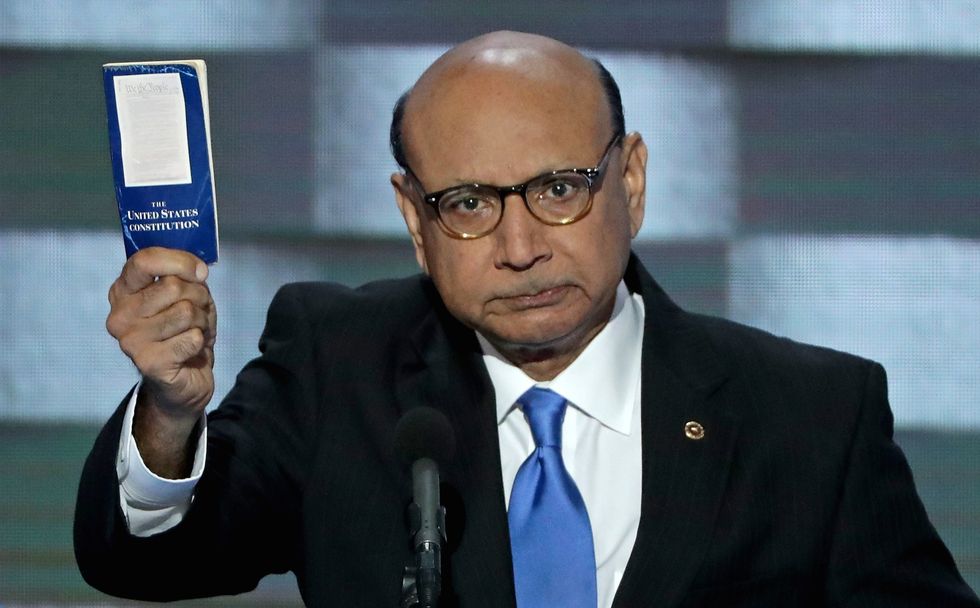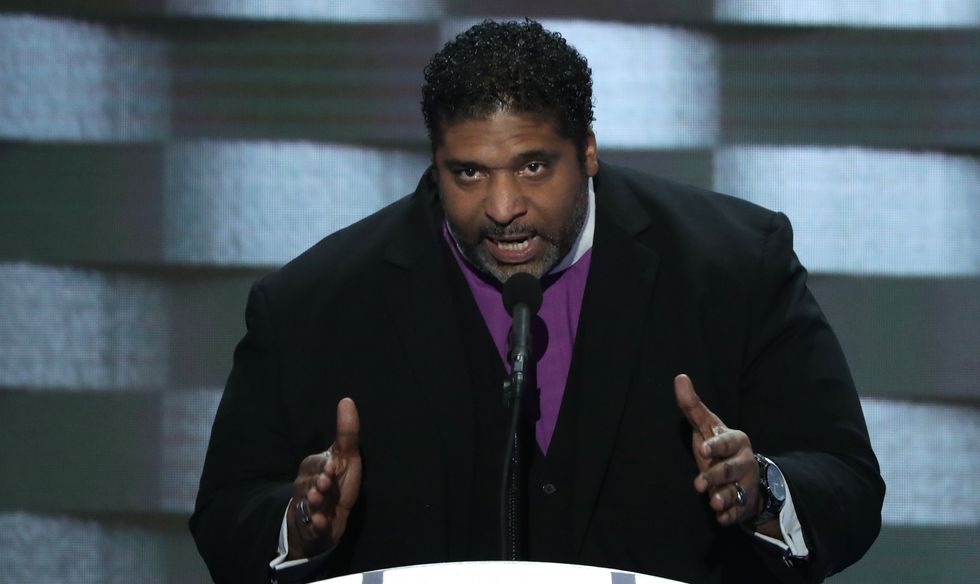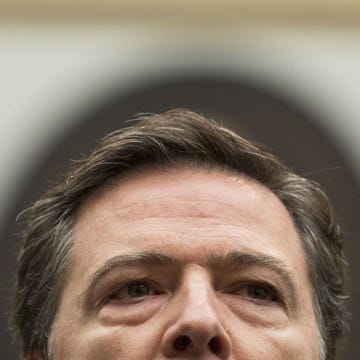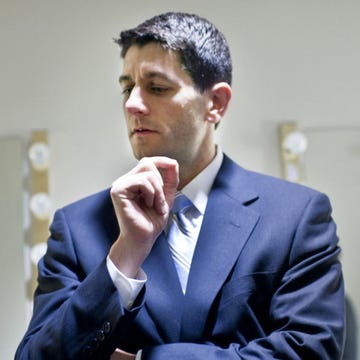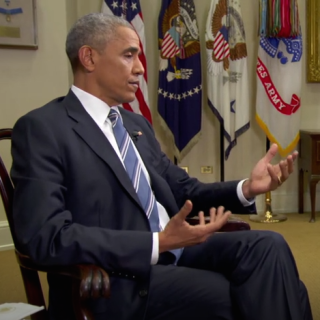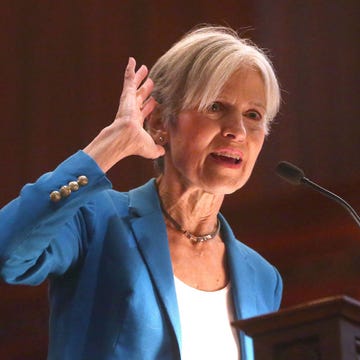PHILADELPHIA—As the Republican National Convention was winding down its penultimate evening last week, I happened by the Colorado delegation, one of the last outposts of the opposition to the once-lunatic notion of nominating Donald Trump for president. I happened into conversation with a woman named Anita Stapleton, who was gathering her things and trying to figure out how she was going to get home to Pueblo City. She was a conservative stalwart who'd been fighting a lonely battle in her town against the curse that is Common Core. That afternoon, she said, the Colorado Republicans in her delegation committed to He, Trump had informed Anita and some of her fellow Ted Cruz acolytes that the party would not pay for their plane fare back to Colorado. She wasn't sure even then whether the threat was empty or not.
"I don't know if I've ever seen anything like this," she said. "Mr. Trump wants things his way, and that's not the way we do things around here. That isn't the way Republicans do things."
It's hard to know how the presidential campaign has changed over the two weeks in which the parties held their respective conventions, or even if it has changed at all. There are no reliable metrics with which to measure the dynamics of this peculiar political season. The polls are all over the lot. Great portions of the nation, which was not in a calm and reasoned state in the first place, are now jumping at shadows.
A very famous, and very conventional—except for her gender—Democratic candidate now has 100-odd days to convince the country not to elect a man who often seems to be one tweet away from being hauled off to Bedlam dressed in the finest canvas waistcoat. There is no system of analytics by which measure to the depth of the rage and terror that have kept the Trump campaign aloft through public appearances by the candidate that would have landed any other person in a straitjacket. There is no depth gauge sensitive enough to measure the fathomless hate and strong enough to withstand the pressure that is building toward some kind of detonation. The process could explode. The process could implode.
There is no way here, at the beginning of August, to reason your way through the poisonous muddle out of which will come the next President of the United States. And this is all taking place in a national and international context of almost weekly bursts of baroque violence. Citizens shot to death by police. Priests beheaded in France. The mass murder of police officers. None of the usual benchmarks apply. The signposts are useless. Too many of them are riddled with bullets or covered with blood. And it's hard to argue with the notion that, if you accept that the world's gone mad, then a madman might well be the most reliable guide through it.
On Thursday night, Hillary Rodham Clinton gave the best speech I ever saw her give. There were the "humanizing details"—which anyone would find insulting in any context other than being the first woman nominated for president by a major party. She hit all her marks. She stayed largely in tune. And in a long middle section, one that could have been titled, "Being a Defense of Wonkery," she was honest and winning.
It became clear to me that simply caring is not enough. To drive real progress, you have to change both hearts and laws. You need both understanding and action. So we gathered facts. We built a coalition. And our work helped convince Congress to ensure access to education for all students with disabilities. It's a big idea, isn't it? Every kid with a disability has the right to go to school. But how do you make an idea like that real? You do it step-by-step, year-by-year… sometimes even door-by-door. And my heart just swelled when I saw Anastasia Somoza on this stage, representing millions of young people who—because of those changes to our laws—are able to get an education. It's true... I sweat the details of policy—whether we're talking about the exact level of lead in the drinking water in Flint, Michigan, the number of mental health facilities in Iowa, or the cost of your prescription drugs. Because it's not just a detail if it's your kid—if it's your family. It's a big deal. And it should be a big deal to your president.
I may be a sucker, and I may just be numb from two weeks of rhetoric, some of which was very good and a great deal of which was incredibly not, but I found that segment completely charming. Yeah, I'm a sap. So what? The other guy is, well, he's a little nuts, isn't he? Let me show you my 12-point plan again until we all settle down a little.
The Sons of Light and the forces of Darkness shall fight together to show the strength of God with the roar of a great multitude and the shout of gods and men: a day of disaster. It is a time of distress fo[r al]l the people who are redeemed by God. In all their afflictions none exists that is like it, hastening to its completion as an eternal redemption.
—The War Scroll, Qumran, circa 143 BCE.
If the Republican convention was a stumble through a dark and terrible forest, the Democratic gathering was a star-spangled whizbang, a brass-band parade in the sunshine. Both conventions stayed true to these perceptions and, therefore, both conventions were in their own way intensely weird. The Trump people crushed all opposition, deflating all the drama at the same time. So, when Trump gave his acceptance speech, the hall was half-full and people fled at the end as though someone had set off a cholera bomb behind the podium. Why wouldn't they stampede? He, Trump had explained to them that the world was full of deadly menace and demonic spirit animals. I'm surprised that some of those bedeviled souls aren't still out on Euclid Avenue, running in circles out of blind panic.
Meanwhile, in Philadelphia, with the Bernie Sanders Irreconcilables proving that the human capacity to be a jackass may well be limitless, the Democratic Party cranked the patriotic fervor up to 11. As a way to drown out the Irreconcilables, the people staging the final night of the convention handed out hundreds of American flags, some of them big enough to fly over your elementary school. When Chelsea Clinton came out to introduce her mother, Section 106 of the Wells Fargo Arena, home of the obstreperous California delegation, had so many huge American flags waving over it that it looked like Cemetery Ridge at Gettysburg just as what was left of Pickett's Division reached the stonewall.
The references to Ronald Reagan were a little too thick for truly progressive tastes, and the Democrats' eagerness to prove their military bona fides got a little disconcerting. But the amount of ground that He, Trump conceded last week to the forces of optimism was so vast that it's difficult to criticize the Democrats for occupying every inch of it they could. And, in that context, there were powerful moments that were grounded in all the good things that this twisted grotesque of a campaign has drowned out.
There was Khizr Khan, the father of Captain Humayan Khan, who was killed by suicide bombers in Iraq. With his wife standing beside him in a hijab, Khan put his claim on an America that is greater than the plot of earth in which he had to bury his son.
"Our son, Humayun, had dreams … of being a military lawyer, but he put those dreams aside the day he sacrificed his life to save the lives of his fellow soldiers. … If it was up to Donald Trump, he never would have been in America."
He was not finished. He was staking his claim on American history, too, all of it, including the part of it fashioned by the powdered-wig set in this very city during the fractious 18th Century.
"Donald Trump, you're asking Americans to trust you with their future. Let me ask you: Have you even read the United States Constitution? I will gladly lend you my copy. In this document, look for the words 'liberty' and 'equal protection of law.'"
And, finally:
"You have sacrificed nothing and no one."
Ultimately, though, there was the Reverend Doctor William Barber from North Carolina, the prophetic activist behind that state's Moral Monday movement, whose voice sounds the way the gospels sound in your head. They put him in the middle of a bunch of politicians giving their Big Moment speeches and it was like someone dropped Pavarotti into the middle of a barbershop quartet competition.
Barber began his movement fighting for voting rights, but he has since moved on to an entire panoply of issues, from the fight against discriminatory laws aimed at LGBT citizens to the preservation of rural hospitals. His movement is multiracial and, even though he came Thursday night to support HRC, he and his movement largely pray outside the camp. In a year in which nothing seems rooted, and everything impermanent, Barber's call to prayer, and that's entirely what it was, summoned his audience and his country to remember that there is, down there below our currently unmoored passions and confusion, a foundation of unchanging stone.
"Listen to the ancient chorus in which deep calls unto deep."
100 days.
More or less.
Click here to respond to this post on the official Esquire Politics Facebook page.

Charles P Pierce is the author of four books, most recently Idiot America, and has been a working journalist since 1976. He lives near Boston and has three children.


